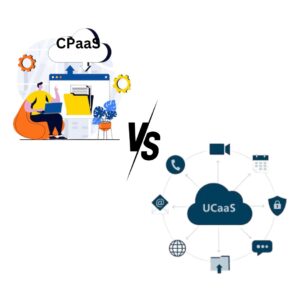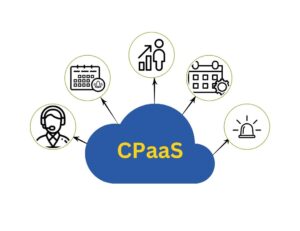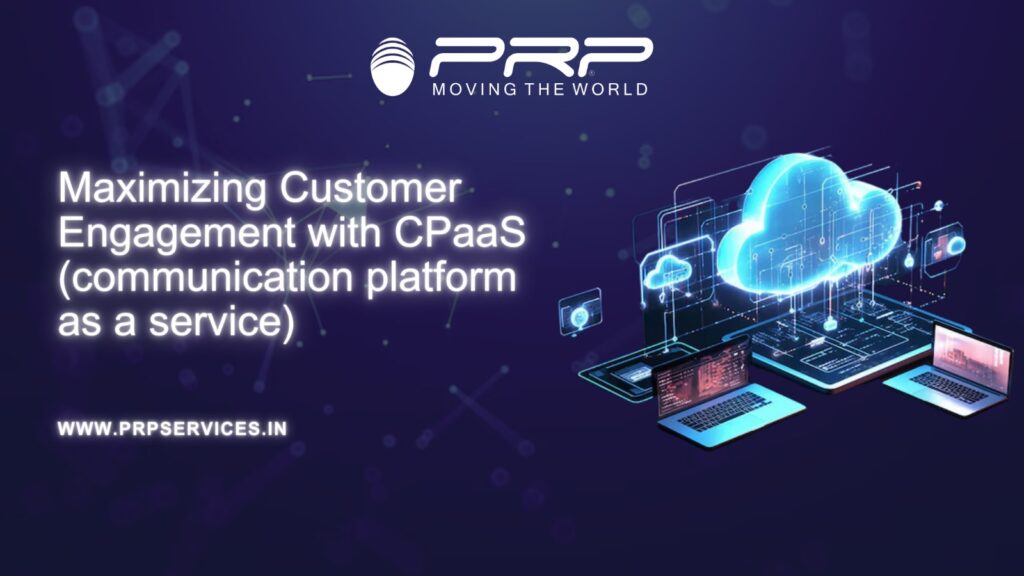Today’s fast-moving digital landscape requires effective communication for businesses to be successful. As companies find to connect with their customers through a variety of channels, traditional methods of communication are no longer sufficient. This is where CPaaS (Communication Platform as a Service) emerges as a game-changer, offering a comprehensive solution to streamline communication processes and enhance customer engagement.
Understanding CPaaS
CPaaS, or Communication Platform as a Service, stands at the front of modern communication solutions, offering businesses unmatched flexibility and efficiency. With cloud-based infrastructure, CPaaS providers provide developers with access to APIs and SDKs (software development kit), eliminating the need for complex, on-premises systems.
With this accessibility, existing applications can easily integrate essential communication functions like voice calls, video conferencing, and messaging. Additionally, CPaaS solutions are highly scalable, allowing businesses of any size or industry to meet their emerging requirements.
CPaaS enables omni-channel communication strategies by engaging users across multiple channels, including voice, SMS, email, and social media, leading to higher customer satisfaction and engagement. Whether they use AI-powered chatbots or branded messaging, businesses can customize communication experiences to meet their specific needs.
Further, strong analytics and reporting tools give businesses valuable insight into communication trends and user behavior, enabling them to optimize their strategies. An increasingly connected world requires businesses to reform their communication capabilities with CPaaS, Promoting innovation and growth.
How Does CPaaS Work?
CPaaS, or Communication Platform as a Service, operates on a cloud-based model, providing businesses with the infrastructure and tools needed to integrate communication functionalities into their applications and services. Here’s a breakdown of how CPaaS works:
- Cloud Infrastructure: CPaaS solutions are hosted on cloud infrastructure, which means that all communication services and resources are accessible via the Internet. This eliminates the need for businesses to invest in and manage on-premises hardware or infrastructure.
- APIs and SDKs: CPaaS providers offer a range of APIs (Application Programming Interfaces) and SDKs (Software Development Kits) that developers can use to integrate communication features into their applications. These APIs abstract away the difficulty of handling communication protocols and infrastructure, making it easier for developers to implement features such as voice calls, SMS messaging, video conferencing, and more.
- Integration: Developers can incorporate CPaaS APIs and SDKs into their applications using standard programming languages and development frameworks. This integration allows businesses to add communication functionalities seamlessly, enhancing the overall user experience of their applications.
- Customization: CPaaS solutions offer businesses the flexibility to customize communication features according to their specific needs. Whether it’s branding messaging with company logos and colors, implementing custom workflows for call routing and handling, or adding AI-powered chatbots for automated customer support, CPaaS platforms enable businesses to tailor communication experiences to their unique requirements.
- Scalability: CPaaS platforms are designed to scale with the needs of businesses. Whether a business is a small startup or a large enterprise, CPaaS solutions can adapt to changing levels of usage and demand, ensuring that communication services remain reliable and responsive as the user base grows.
- Monitoring and Analytics: Many CPaaS providers offer monitoring and analytics tools that allow businesses to track communication metrics such as call volumes, message delivery rates, user engagement, and more. This data provides valuable insights into communication trends and user behavior, enabling businesses to optimize their strategies for maximum impact.
CPaaS vs. UCaaS

CPaaS (Communication Platform as a Service) and UCaaS (Unified Communications as a Service) are cloud-based communication solutions that manage specific needs within business communication. Here’s an overview of their differences:
CPaaS:
- Focuses on empowering developers with tools and APIs to seamlessly integrate real-time communication functionalities into applications and services.
- Offers extensive customization options, allowing businesses to tailor communication experiences to their specific needs and preferences.
- Developer-centric, with APIs and SDKs designed for integration by developers, enabling the addition of features like voice calling, messaging, and video conferencing.
- Commonly used for customer engagement, enhancing websites, mobile apps, and business workflows, and implementing omnichannel communication strategies.
UCaaS:
- Focuses on providing businesses with a comprehensive suite of communication and collaboration tools, typically delivered as a unified platform.
- Provides pre-packaged communication tools and features, including voice calling, video conferencing, instant messaging, email, and collaboration tools.
- Designed to be user-friendly and accessible to non-technical users, offering a unified interface for accessing various communication channels.
- Commonly used for internal communication and collaboration within organizations, offering features like hosted PBX for voice calling, unified messaging, and collaboration tools.
Key Differences:
- Audience: CPaaS targets developers and businesses seeking to place communication features into applications, while UCaaS targets businesses in need of a comprehensive communication and collaboration platform for their employees.
- Customization vs. Pre-Packaged Solutions: CPaaS offers customization options for tailored communication experiences, whereas UCaaS provides pre-packaged solutions with standard features.
- Developer-Centric vs. End-User-Centric: CPaaS is developer-concentrated, requiring integration by developers, while UCaaS is end-user-concentrated, offering a user-friendly interface for non-technical users.
Benefits of CPaaS
CPaaS (Communication Platform as a Service) emerges as a versatile solution, equipping businesses with a powerful weapon to enhance their communication capabilities. Here’s a detailed exploration of its key benefits:
- Scalability: CPaaS solutions enjoy exceptional scalability, empowering businesses to effortlessly adjust communication capacities in response to shifting demands, user base variations, or business expansion. Whether scaling up during peak periods or downsizing during quieter times, CPaaS platforms adapt dynamically to ensure consistent and reliable communication services.
- Flexibility: Businesses enjoy unparalleled flexibility with CPaaS, enabling them to tailor communication experiences precisely to their needs and preferences. use a diverse show of APIs and SDKs, companies can customize features like voice calling, messaging, and video conferencing to seamlessly align with their brand identity and user expectations.
- Cost-Effectiveness: Operating on a pay-as-you-go model, CPaaS delivers a cost-effective solution, with businesses paying only for the communication services they utilize. This eliminates the need for heavy upfront investments in hardware or infrastructure and changes access to CPaaS across businesses of all sizes and budgets. Moreover, competitive pricing and transparent billing further optimize communication expenses.
- Rapid use: CPaaS solutions streamline the use of communication features in applications and services, reducing time-to-market and helping innovation. Equipped with pre-built APIs and SDKs, developers seamlessly integrate communication functionalities without requiring mass development or technical expertise, thereby saving valuable time and resources.
- Enhanced Customer Engagement: CPaaS empowers businesses to elevate customer engagement through personalized communication experiences. Leveraging features such as interactive voice response (IVR) systems, chatbots, and real-time messaging, businesses engage with customers meaningfully, driving heightened levels of satisfaction, loyalty, and engagement.
- Integration with Existing Systems: CPaaS platforms seamlessly integrate with existing business systems and applications, maximizing the utility of technology and infrastructure investments. Whether integrating with CRM systems, e-commerce platforms, or customer support tools, CPaaS ensures seamless alignment with existing workflows, thereby enhancing efficiency and productivity.
- Analytics and Insights: Many CPaaS providers offer durable analytics and reporting tools, furnishing businesses with valuable insights into communication trends, user behavior, and campaign performance. By monitoring key metrics such as call volumes, message delivery rates, and user engagement, businesses refine their communication strategies for maximum impact and return on investment (ROI).
Key Function of CPaaS
CPaaS, short for Communication Platform as a Service, is a game-changer for businesses, offering a multiple toolkit to supercharge their communication capabilities. Here’s a closer look at some of the essential functions it brings to the table:
- Voice Calling: With CPaaS, businesses seamlessly integrate voice calling features right into their applications, enabling users to place and receive calls directly within the app itself, without the hassle of external phone systems.
- Messaging (SMS/MMS): Through CPaaS, businesses tap into APIs for sending and receiving text messages (SMS) and multimedia messages (MMS), facilitating smooth communication with customers through notifications, alerts, and engaging conversations.
- Video Conferencing: CPaaS empowers businesses with video conferencing capabilities, smooth virtual face-to-face meetings, boosting collaboration, and making virtual events or online consultations.
- Chat: CPaaS offers robust chat APIs for real-time messaging within applications, whether it’s one-on-one or group chats, supporting customer interactions, and even unpacking chatbots for automated assistance.
- Interactive Voice Response (IVR): CPaaS enables businesses to craft interactive voice response systems for callers, guiding them through prompts, efficiently routing calls, and automating processes to enhance the overall customer experience.
- Number Provisioning and Management: CPaaS platforms provide tools for businesses to acquire, manage, and handle phone numbers effortlessly, whether it’s local, toll-free, or international, for tasks like call tracking and analytics.
- Authentication and Verification: CPaaS offers authentication and verification APIs to beef up security for user accounts and transactions, with features like two-factor authentication (2FA) and phone number verification.
- Call Tracking and Analytics: CPaaS platforms come equipped with tools for monitoring and analyzing call metrics such as volume and duration, delivering valuable insights into customer behavior and the effectiveness of communication campaigns.
- Integration with CRM and Business Systems: CPaaS solutions seamlessly mesh with existing CRM and business systems, syncing communication data to track interactions, personalize customer experiences, and streamline processes for maximum efficiency.
- WhatsApp Business: WhatsApp’s CPaaS (Communication Platform as a Service) enables businesses to streamline communication by using WhatsApp’s Business API. In CPaaS, messaging workflows are automated, WhatsApp-approved message templates are incorporated, interactive messaging experiences can be created, and performance analytics can be accessed.
Use Cases of CPaaS

CPaaS, or Communication Platform as a Service, offers multiple practical applications across industries, transforming the landscape of business communication and interaction with customers, employees, and stakeholders. Here’s a breakdown of some notable CPaaS use cases:
- Customer Engagement and Support: CPaaS empowers businesses to enrich customer engagement and support through diverse channels like SMS, voice calls, chatbots, and social media messaging. By integrating CPaaS into their customer service platforms, businesses can provide tailored assistance, promptly resolve inquiries, and deliver seamless customer experiences.
- Appointment Reminders and Notifications: Industries such as healthcare, salons, and service-based businesses leverage CPaaS to dispatch automated appointment reminders and notifications via SMS or voice calls. This helps minimize no-shows, streamline scheduling processes, and enhance customer satisfaction.
- Marketing Campaigns and Promotions: CPaaS equips marketers with the tools to execute targeted marketing campaigns and promotions utilizing SMS/MMS messaging, voice broadcasts, and interactive voice response (IVR) systems. use CPaaS capabilities enables businesses to effectively reach their audience, monitor campaign performance, and promote customer engagement.
- Internal Communication and Collaboration: CPaaS smooth seamless internal communication and collaboration among distributed or remote teams through features like video conferencing, team messaging, and collaboration tools. This supports real-time collaboration, knowledge sharing, and productivity regardless of geographical barriers.
- Event Management and Engagement: Event organizers lifting CPaaS to manage and engage attendees through functionalities like event registration, ticketing, and real-time communication. CPaaS enables organizers to create immersive event experiences, support networking, and enhance attendees’ engagement.
- Emergency Alerts and Notifications: Educational institutions, businesses, and government agencies utilize CPaaS to expand emergency alerts and notifications to employees, students, or residents during crises such as natural disasters or security threats. CPaaS ensures timely communication, enhancing safety and awareness.
- Sales and Lead Generation: CPaaS aids sales and lead generation efforts by automating outbound calling campaigns, lead scoring, and real-time notifications. Integrating CPaaS into sales processes enables businesses to identify and learn qualified leads, ultimately improving conversion rates.
- Authentication and Security: CPaaS offers authentication and verification capabilities, enhancing security measures such as two-factor authentication (2FA) and phone number verification. This strengthens user account security, transaction authenticity, and access control protocols.
- Multichannel Customer Communication: CPaaS empowers businesses to engage with customers across diverse communication channels including SMS, voice, email, and social media messaging. This seamless omni-channel approach enables businesses to personalize communication, meet customers’ preferences, and promote engagement and loyalty.
Why Choose PRP Service Pvt Ltd as a CPaaS Service Provider,
- Reliability: PRP Services Pvt Ltd offers a reliable infrastructure with high uptime and minimal downtime, ensuring that your communication features are consistently available to users.
- Scalability: PRP Services Pvt Ltd provides scalable solutions that can grow with your business. Whether you’re a startup or an established enterprise, their CPaaS offerings could adapt to your changing needs.
- Security: Security is paramount when dealing with communication data. PRP Services Pvt Ltd prioritizes robust security measures to protect sensitive information, ensuring compliance with industry standards and regulations.
- Ease of Integration: Choosing a CPaaS provider that offers easy-to-use APIs and comprehensive documentation can streamline the integration process for developers, saving time and resources.
- Customization Options: PRP Services Pvt Ltd could offer customizable solutions that Allow you to customize communications features to fit your specific requirements and branding.
- Support and Maintenance: Choosing a CPaaS provider like PRP Services Pvt Ltd means access to dedicated support services and regular maintenance updates, ensuring smooth operation and quick resolution of any issues that may arise.
- Cost-Effectiveness: Consider the pricing structure offered by PRP Services Pvt Ltd. They provide competitive pricing models that offer value for money, allowing you to leverage advanced communication features without breaking the bank.
For more information Contact us Now.

